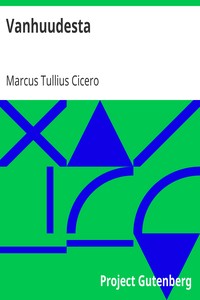Vanhuudesta by Marcus Tullius Cicero
"Vanhuudesta" by Marcus Tullius Cicero is a philosophical work written in 44 BCE. Set as a dialogue, the work features the elder statesman Cato discussing old age with two younger men, Scipio and Laelius. Cato systematically refutes four common accusations against old age: that it removes people from active life, weakens the body, diminishes pleasure, and brings closeness to death. Through reasoned argument, he defends aging as potentially fulfilling and addresses fundamental
questions about mortality and human purpose. (This is an automatically generated summary.)
Read or download for free
| How to read | Url | Size | |||
|---|---|---|---|---|---|
| Read now! | https://www.gutenberg.org/ebooks/53886.html.images | 128 kB | |||
| EPUB3 (E-readers incl. Send-to-Kindle) | https://www.gutenberg.org/ebooks/53886.epub3.images | 120 kB | |||
| EPUB (older E-readers) | https://www.gutenberg.org/ebooks/53886.epub.images | 120 kB | |||
| EPUB (no images, older E-readers) | https://www.gutenberg.org/ebooks/53886.epub.noimages | 106 kB | |||
| Kindle | https://www.gutenberg.org/ebooks/53886.kf8.images | 245 kB | |||
| older Kindles | https://www.gutenberg.org/ebooks/53886.kindle.images | 235 kB | |||
| Plain Text UTF-8 | https://www.gutenberg.org/ebooks/53886.txt.utf-8 | 115 kB | |||
| Download HTML (zip) | https://www.gutenberg.org/cache/epub/53886/pg53886-h.zip | 122 kB | |||
| There may be more files related to this item. | |||||
About this eBook
| Author | Cicero, Marcus Tullius, 107 BCE-44 BCE |
|---|---|
| Translator | Hidén, K. J. (Karl Julius), 1867- |
| Title | Vanhuudesta |
| Note | Wikipedia page about this book: fi.wikipedia.org/wiki/Vanhuudesta |
| Credits | E-text prepared by Juhani Kärkkäinen and Tapio Riikonen |
| Reading Level | Reading ease score: 30.2 (College-level). Difficult to read. |
| Language | Finnish |
| LoC Class | PA: Language and Literatures: Classical Languages and Literature |
| Subject | Old age |
| Category | Text |
| EBook-No. | 53886 |
| Release Date | Jan 4, 2017 |
| Most Recently Updated | Oct 23, 2024 |
| Copyright Status | Public domain in the USA. |
| Downloads | 125 downloads in the last 30 days. |
| Project Gutenberg eBooks are always free! | |

